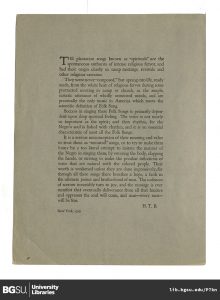One of the best known spirituals in the United States is Deep River. Though, like all spirituals and folk songs, its origins are unknown, it was popularized in the early 20th century by Black American composer Harry Burliegh. In Burleigh’s first published arrangement of Deep River, he provides an account of the origins of spirituals. This foreword allows us to glimpse into the mind of Black American musicians in the early 20th century and see some of their thoughts on the history of spirituals, and their intended uses within society.
Burleigh asserts that the spirituals “sprang into life…from the white heat of religious fervor…” and that they are the “ecstatic utterance of wholly untutored minds.”1 Burleigh seems invested in distancing spirituals from any sort of academic or “art song” contexts. In fact, Burleigh argues that the spirituals are “the only music in America which fits the scientific definition of Folk Song.”1 Burleigh wants to make it abundantly clear that the spirituals are a natural outgrowth of Black culture in America.
This foreword also highlights some of the struggles that Black Americans faced with regards to appropriation of spirituals. Burleigh specifically says that the spirituals are not to be used in minstrel performances.1
He asserts that these songs must be “done impressively,” otherwise their message is cheapened.1
In these ideas, we see two aspects of spirituals that Burleigh is hoping to solidify the importance of. The first is that spirituals are not art songs, or the results of academic inquiry, but rather the result of an entire culture creating music spontaneously. The second is that these songs should be treated with the respect and dignity that any art song or religious statement would be treated. Burleigh is arguing that the spirituals are derived far from the theaters and concert halls, but that they should now be performed in these venues with the same reverence that audiences apply to other beloved works of the western classical canon.

